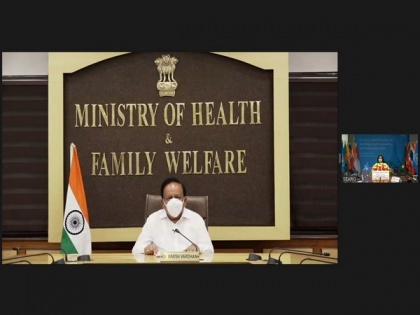Dr Harsh Vardhan attends 73rd session of WHO South East Asia region through video conferencing
By ANI | Published: September 9, 2020 06:59 PM2020-09-09T18:59:19+5:302020-09-09T19:10:07+5:30
Union Health Minister Dr Harsh Vardhan on Wednesday digitally attended the 73rd session of World Health Organisation (WHO) South-East Asia region.

Dr Harsh Vardhan attends 73rd session of WHO South East Asia region through video conferencing
Union Health Minister Dr Harsh Vardhan on Wednesday digitally attended the 73rd session of World Health Orgsation (WHO) South-East Asia region.
Vardhan highlighted the importance of regional committee platforms as being "very useful not only for highlighting the advancements made as a result of all our collective efforts but also in discussing some of most pressing regional and global public health issues and the way forward."
"Our common goal of 'Health for All' unites us all, even from thousands of miles away, and this very goal will drive our discourse on regional health today," Vardhan said in his address to dignitaries.
Dr Harsh Vardhan addressed the gathering first as the Chair of the 72nd session before handing over the charge to the new Chair Anutin Charnvirakul, Deputy Prime Minister and Minister of Health, Thailand and then addressed the dignitaries present on behalf of India.
Addressing the dignitaries as the outgoing chairperson, he offered his deepest condolences for the loss of lives across the region due to COVID-19. He also extended heartfelt gratitude to the brave frontline workers of the region whose "collective efforts at the cost of their own safety and wellbeing have not only helped save lives but have also shown us resoluteness in caring for all in the face of adversity."
Speaking on India's commitment to sustain its health goals, he elaborated on the National Health Policy 2017, which aims to provide affordable healthcare for all citizens of India and Ayushman Bharat launched in 2018 which marks a significant milestone on the road towards universal health coverage and is also the world's largest government-sponsored free healthcare assurance programme.
"India achieved phenomenal success with its low-cost medicine stores called Jan Aushadhi Kendras which provide quality affordable essential medicines to the people in need," he said.
The Union Health Minister informed the member states of the "significant achievements like the elimination of poliomyelitis, maternal and neonatal tetanus and yaws as well as considerable reductions in maternal and newborn mortality."
He also informed them of India's ambitious target of elimination of tuberculosis by 2025, five years ahead of the global target and commitment to eliminate neglected tropical diseases like lymphatic filariasis and kala-azar.
Speaking on the multi-faceted and multi-sectoral nature of health governance he said, "The Swachh Bharat Abhiyaan, Housing for All by 2022, Nutrition Mission, Skill Development, Smart Cities, Eat Right India, Fit India and many such multi-sectoral initiatives have been launched which are bringing us dividends in terms of elevating the quality of life of our people thereby elevating their health condition."
Dr Vardhan also spoke on the benefits of the National Digital Health Mission, which envisages the creation of a digital health ecosystem to enable Indian citizens to have unique health IDs, digitized health records as well as a registry of doctors and health facilities to ensure seamless delivery of health services across the country.
This is the first time the two-day event is being held entirely through virtual platforms owing to the COVID-19 pandemic. The 73rd session is being hosted by the Government of Thailand (from Bangkok) while the previous session was held in New Delhi.
South-East Asia Region, with its 11 member states, represents a quarter of the world's population and strengthening the healthcare systems of member states of the region will help in improving the state of global health achieving both the Triple Billion target and Sustainable Development Goals.
( With inputs from ANI )
Disclaimer: This post has been auto-published from an agency feed without any modifications to the text and has not been reviewed by an editor
Open in app